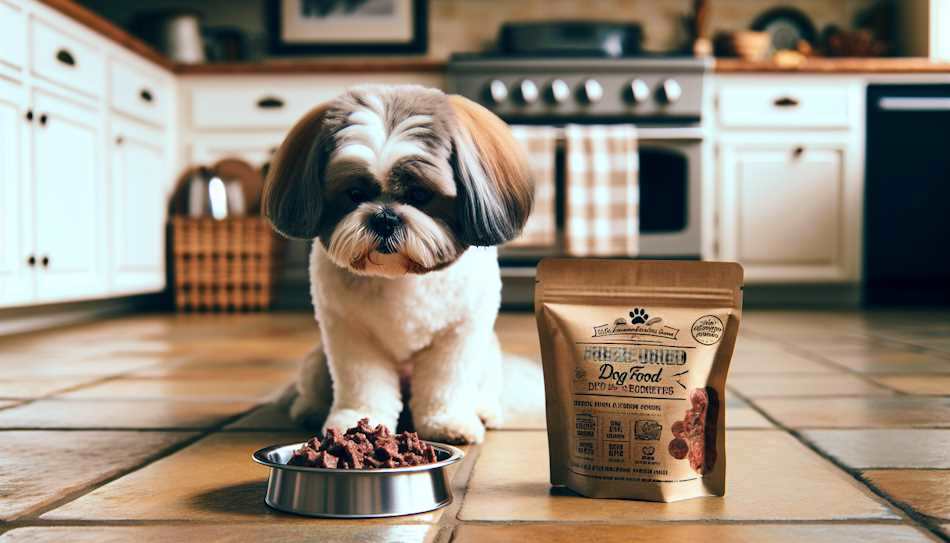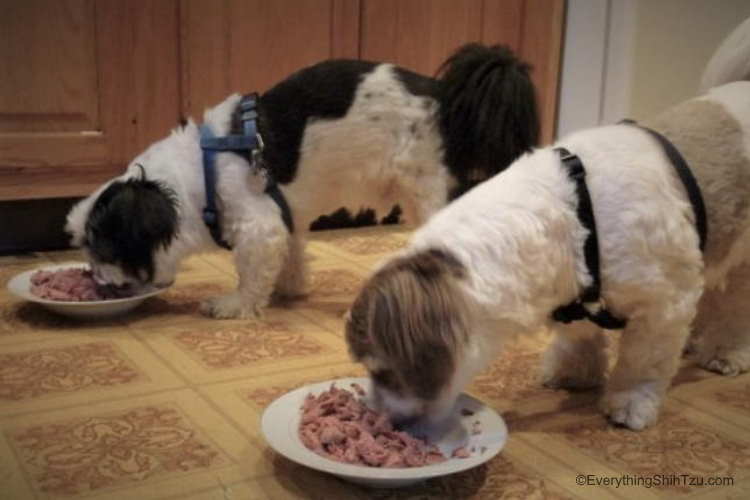- Home
- Best Puppy Food
- shih tzu not eating
Why is My Shih Tzu Not Eating?
What To Do When Your Shih Tzu Is Not Eating
BY MOLLY | EVERYTHINGSHIHTZU.COM
When your Shih Tzu leaves her food bowl untouched, especially for more than one or two meals, you probably worry that something isn’t quite right.
After all, when you can’t eat or you lose your appetite, it’s usually because you’re not feeling well or something is bothering you. But is it the same case with your canine companion?

If your Shih Tzu does not eat a meal or two in a particular day, there’s likely no cause for concern, she may just be tired, not very hungry, or has an upset stomach and should return to normal eating the next day. However, if it's been a couple of days, and your pup is still not eating, it’s time to investigate.
A few reasons your Shih Tzu is not eating could include:
- an illness
- stress, or anxiety
- the food doesn’t agree with them
- they don't like the taste, or
- possibly a loose or hurting tooth
Your first step is to check the food to ensure it’s
not expired or spoiled.
If the food is not spoiled, the next step may be a vet visit to pinpoint the exact reasons for your dog’s appetite loss so that you can address it properly.
Check Your Shih Tzu’s Food
First, you need to figure out why your pup isn’t eating so you can fix the problem. Before jumping to unpleasant conclusions, check your dog’s food.
There is a chance something could be wrong with it; it might have expired, or something could have gotten into your dog’s bowl. This possibility could be especially true if your dog otherwise seems happy and healthy.
If you believe this is the case, dump the contents of the dish, wash the bowl thoroughly, and give your pup some fresh food. If she starts eating, then you’ve solved the problem.
To avoid this issue in the future, make sure to wash your pup’s food and water dishes every day, keep her food in an airtight container and toss it when it’s expired.
For wet dog food, once opened, store it in the fridge in a sealed container and serve it within three days.
There could also be a possibility that your dog doesn’t like her food anymore. You can try new food to see if this helps, but this process takes some time.
You can’t simply switch to a new food, you need to gradually transition to new food over a few weeks to avoid stomach upset.
Instead, offer your pup a few bits of the new food, just to see how she reacts. However, whether she seems interested or not, it’s best to see your vet first, just to rule out other possibilities.
Check Your Shih Tzu’s Teeth
If your pup has a loose or broken tooth, she’s not going to feel like eating, at least not dry dog food.
If your furry friend isn’t showing any other symptoms of distress and her food is fresh, a hurt tooth or sore gums could be to blame.
Of course, the only way to know for sure is to schedule a dental check-up with your vet. Your pet can check your dog’s teeth and do dental x-rays to see what the potential problem might be and look for any signs of dental disease.
Sometimes, older dogs might be missing teeth, which makes it difficult for them to eat certain foods.
Whatever the case may be, if your vet finds an issue with your dog’s teeth, she can help fix the problem. For example, if it’s a broken tooth, she can pull the tooth; if it’s sensitive or missing teeth, your vet might recommend that you give your pup softened dog food.
You can simply put some warm water over your pup’s dry food and let it sit for a few minutes before serving it to your pup.
This way, your dog can continue to eat the same food (which helps avoid stomach upset or transitioning to something new) but without the pain to her teeth and gums.
Check for Underlying Issues
If all looks good with your Shih Tzu’s teeth, then your vet will dig deeper to find the cause of your dog’s shift in her eating habits.
Loss of appetite is a symptom of several health conditions, including diabetes, kidney disease, cancer, and heart or liver disease.
Your pup could also be experiencing some type of gastrointestinal issues or discomfort, or even problems swallowing food.
There are several possibilities, which is why you need to schedule a vet appointment as soon as possible.
Your vet will run a series of tests, including a physical exam, bloodwork, x-rays, and other diagnostic tests as needed.
If your Shih Tzu suffers from any health problems, your vet will go over treatment options and provide recommendations for what is best for your canine companion.
Depending on the condition, your dog may need medicine or surgery, and the problem might be short-term and curable, or it could be a long-term condition that you’ll need to treat for your pet’s lifetime.
Either way, once you start the proper treatment, you should see an improvement in your dog’s appetite.
Changes in Your Dog’s Environment Can Affect Appetite
Your vet will rule out any underlying health issues and dental problems first. If your vet doesn’t find any physical reasons for your Shih Tzu’s appetite loss, then it’s time to turn to alternative possibilities.
Just like people, a dog’s mood can change based on her surrounding environment.
Think about any recent changes in your dog’s life or schedule.
For example, moving to a new home, a family member moving out (whether because of divorce, a child going off to college, etc.), shifts in the weather, or perhaps you’ve started working longer hours.
Sometimes, dogs have trouble adjusting to these changes, leading to stress and anxiety, which can lead to a decreased appetite.
If your dog stops eating because of behavioral issues, changes in the environment, or she’s just a picky eater, try these tips:
- Put your pup on a regular feeding schedule, typically twice a day, and make sure you feed her the appropriate amount of food each time.
- Limit the number of treats your dog gets. Think about it, how much do you want to eat at dinner if you’ve snacked all day long?
- Try out other food bowls or alternative ways of serving your dog’s food. For example, you could try a slow-feed bowl, an elevated bowl, or simply placing a few bits of food on a lick-mat or a plate on the floor. It could be that your dog needs a more comfortable way to eat. Plus, sometimes, just the different techniques can make mealtime more appealing and exciting for your pooch.
- Take your dog for a walk before mealtime.
- Sprinkle a little bit of wet food on top of your dog’s dry food to add some extra-tasty temptation. Another option is to sprinkle a small bit of stinky cheese to engage their sense of smell.
How Long Can Small dogs go without food
When it comes to how long a small dog can go without eating, it can vary from dog to dog.
But most experts agree that most dogs can go a couple of days without eating but recommend keeping a close eye on them
Also, your dog must have access to fresh, clean drinking water throughout the day. If your dog has refused to drink for more than two days, promptly schedule an appointment with the vet.

Once you learn why your Shih Tzu isn’t eating, you’ll be able to determine the best way to fix the problem. Then, you can tell your precious pup, “Bon apetÍt!”
- Home
- Best Puppy Food
- shih tzu not eating
Posted 2/25/2021



